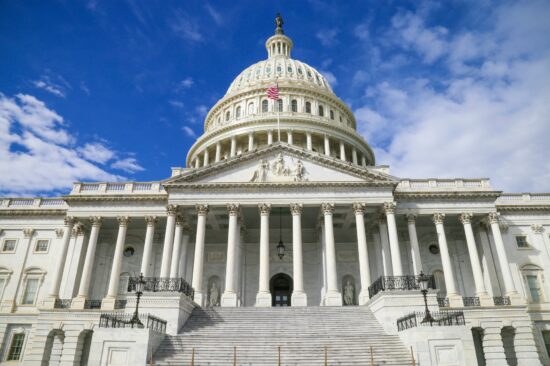What is the promise of America? In the chaotic world of 2016, it is a reasonable question. Our politics are polarized and our social life is badly fractured. We are now a nation of individuals. And all around us we observe the bifurcation and division—whether moral, economic, social, or political—that defines our public life. In my own estimation, perhaps the best word to describe our present situation is simply disillusionment. But how did we get here? In The Fractured Republic, author Yuval Levin considers these questions and offers thoughtful solutions to America’s dilemma. Recently, I had the privilege to interview Yuval Levin to further explore these insights. You can find the entire interview below.
JW: Yuval, thanks for taking the time to do this interview. Since its release, your book, The Fractured Republic, has garnered much attention from folks on both sides of the aisle. Can you tell us what inspired you to write it? And perhaps, briefly, tell us what opened your eyes to these conclusions?
YL: Thanks very much. I was frankly moved to write the book by observing the bipartisan dysfunction of our politics, even before this particularly dysfunctional election year. I think people have a sense that our political institutions and leaders are somehow disconnected from some key realities of American life, and are just acting out a script that isn’t really responsive to what the country needs or what the public wants. The book begins from the fact of that frustration and tries to think through what it might be rooted in, and how it might be alleviated. It argues that both left and right, in different ways, are blinded to some key realities of 21st century life by a nostalgia for what they take to be America’s 20th century heyday, and that a crucial part of what that causes them to overlook is the fracturing or fragmentation of our society, and the distinct problems it creates. That fragmentation isn’t quite reversible, but by recognizing it we can find our way toward solutions to the problems it creates—solutions that, it seems to me, would be rooted in a revival of subsidiarity or decentralization in how we think about our public life; a sense that solutions work from the bottom up and that what is most important in most people’s experience happens at the level of the inter-personal community. I’ve been making the case for solutions of that sort for some time now, as have a number of other reform-minded conservatives. But the book really tries to show where those kinds of solutions and that way of thinking come from, by laying out the diagnosis that then points to our prescriptions.
JW: Central to your argument is the idea that one of our greatest problems as a people is actually nostalgia. And truthfully, that rings true for me. It is not uncommon at all for me to hear people reflect fondly on better days in America’s past. To what do you attribute this obsession? Do you reject the idea that America’s greatness, our “golden age,” lies behind us?
YL: Some degree of nostalgia is of course not only unavoidable but also worthwhile. We need to learn from the best of what our country and our civilization have been in the past, and we need to build on our traditions and our inheritance. But American politics today is blinded by a particularly powerful and distorting sort of nostalgia. I describe it as a baby-boomer nostalgia, though it blinds not only the baby boomers but all of us. It’s a nostalgia for America as it was (or as we think it was) in the decades after the Second World War. Conservatives tend to miss the culture of that time—the more stable families, the relatively high levels of church attendance and child-bearing, the relatively low levels of divorce and out-of-wedlock births. Liberals tend to miss the economy of that time—a heavily regulated and consolidated economy characterized by big corporations working with big government and big labor to manage the nation’s economic life, backed by enormous public confidence in large institutions and by the immense advantages that the United States had in the wake of the war, with our biggest competitors having burned each other’s economies to the ground. Conservatives are generally happy that the economy has since liberalized and become more competitive but unhappy that the culture has liberalized and become less consolidated; liberals are happy the culture has liberalized but unhappy the economy has. And somehow neither quite sees that these are two sides of the same coin—that American life as a whole has become less consolidated and more fragmented, less secure but more dynamic, less cohesive but more diverse. We’re not wrong to miss what mid-century America had to offer, but we are wrong to think we can simply have it back by somehow reversing course.
And so we have two competing nostalgias trying to win political power rather than a politics of competing ideas about how to use the strengths of a diverse, dynamic society to address the weaknesses of a fragmented, insecure society. I think the baby boomers themselves, who are still our leaders (notice, for instance, that the two major parties are running two 70-year-olds for president this year) are not well positioned to see their way out of this nostalgic bind. But younger Americans just might do that, and so I certainly don’t think America’s best days are behind it. But I do think a revival will require us to see that mid-century America was not a norm but was a very exceptional version of our society, and that to adapt and address our problems now we need to apply some enduring principles to new circumstances.
JW: The subtitle of the book refers to America’s present as the “age of individualism.” Again, I don’t think most people would differ with that categorization. In fact, for millennials like myself, we have never known anything else. But when and how did this become so dominant? What did it replace?
YL: You’re right, today it seems perfectly natural. I was born in 1977, and it seems perfectly natural to me too. And America has often been a very individualist society in the past too. Alexis de Tocqueville saw that in the America he visited in the 1830s. But that mid-20th-century period that our politics so misses now was a time of unusual cohesion and consolidation in our country. In the first half of the 20th century—thanks to industrialization, and progressive politics, and mass media, and two world wars and a depression—American life was subject to intense consolidating pressures. You might say that many of the great social forces in our country were driving each American to become more like everyone else. But beginning right after the war, first in the culture and then in the economy and in politics, there was a great easing of these pressures, and in time a reversal, so that in the second half of the 20th century many of the great social forces in our country were driving each American not to become more like everyone else but to become more like himself or herself. You can see that in the emergence of the alienated loner as a great hero of literature and film and music starting in our mid-century culture. You can see it in liberalization and in some respects deregulation of our economy. You can see it in the breakup of the unusual mid-century elite consensus in our politics.
In time, that greater individualism, that “diffusion” as I call it, began to transform into polarization, so that rather than a society consolidated at the center (politically, economically, socially) we have increasingly become a society concentrated at two ends. In economics we talk about that in terms of inequality. In politics it’s in terms of polarization. In our social lives we see it in the dramatic differences in basic habits and practices between people at the top and bottom of the educational or income scales.
Individualism has been a great liberating force in a lot of ways for our society. And there were some very bad downsides to our mid-century consolidation—above all in its exclusion of racial minorities from the core of American life. But individualism has also meant a breakdown of our cohesive social order (and especially a breakdown in family structure), and it has meant greater economic division and social division. These are facts of life for us, but it’s important to see how we got here if we’re going to understand how we might address the problems we have without giving up the gains we’ve made.
JW: The idea of a lost or “hollowed” middle appears throughout the book. And you argue that this is present in multiple dimensions of our public life (social, economic, political). Can you explain what that means and how these things are interrelated?
YL: Yeah, as I suggested, the greater individualism that has been driving key social and economic and political trends in American life over time has exhibited itself as various forms of polarization. And what that has meant is that over and over we see a concentration at the ends (rich and poor, right and left) and a hollowing out of the middle. We have also seen, as a result of this, a related hollowing out of the middle spaces in our society between the individual, on the one hand, and the national state or the federal government on the other hand.
In a healthy free society, those middle spaces are really where we live. They are filled with mediating institutions—the family, the church, the school, the community, the workplace, the union, the civic association, the marketplace—which allow us to address our problems at eye level with each other and to take part in a practical kind of self-government. But when we think of our society as consisting more and more of isolated individuals rather than as members of interconnected communities like these, we increasingly look to the national government as the only common institution, since it can treat us all as individuals from a great distance, providing us with some benefits and services without requiring much of a commitment or sacrifice or participation in return. I think this is a very dangerous pattern for a free society, because it tends to offer a form of freedom devoid of responsibility and participation, which I just don’t think is sustainable. It is also often not very good at addressing the very real problems we have.
But many observers of societies like ours have noted their tendency to come to understand themselves as consisting of isolated individuals and a national government, and neglecting all that stands between. That’s one of the dangers of individualism. And I think to address the challenges of this age of individualism, we need to recover an appreciation for those mediating institutions.
JW: One of the solutions that you prescribe for our fractured culture is a recovery of “subsidiarity.” Can you tell us what subsidiarity is and how it might offer America a better path forward?
YL: Subsidiarity is a way of speaking about exactly that kind of recovery of an appreciation for the mediating institutions. The term really comes from the Catholic social tradition, but it is akin to what in politics we might describe as federalism, or what in general we might call decentralization. I like “subsidiarity” because it is a little more precise than that. It’s not just about moving power toward the individual, it is about placing power as close to the level of the interpersonal community as reasonably possible. So it doesn’t deny that there are times when power really should reside at the national level—as when dealing with national crises, or with national defense, or with challenges that require too great an exertion of resources for local communities to be capable of. But the idea is that we ought to have a default preference for the local and communal, as standing between the extremes of the individual and the state.
I think subsidiarity is good for us today on several levels. First, it’s a natural counter-balance to our inclination to excessive moral individualism on the one hand and to excessive administrative centralization on the other. I think those two excess are closely related to each other, they’re not opposites, they’re two sides of one coin. They make each other possible. And they have to be counterbalanced by an inclination toward the middle layers of life. I also think as a practical matter it is just more likely that solutions to some of the most concrete problems we have—like entrenched poverty, like the inability of our education system to serve the most disadvantaged Americans, like the inefficiency of our health-care system—will arise by experimentation close to the ground than that they will come from expert managers at the center. So subsidiarity likely offers a more effective way to address our problems.
But finally, and most important, I think subsidiarity allows us to govern ourselves as much as reasonably possible at the interpersonal level, where people can see each other face to face, where help can come with a warm touch and a degree of personal compassion and where people are more likely to feel drawn to be responsible, to do their duty, to help their neighbors, to set a good example, and to be moved by what Lincoln called the better angels of our nature. It’s a way of recognizing our challenges as human challenges—not technical or abstract problems but human problems that are inevitably each an incorrigible mix of the moral and the social and the cultural and the economic and the political.
JW: Moving to the idea of religion in America, you argue in the chapter on subcultures that even though many of our dominant mainstream institutions have become hostile toward religion, all is not lost. In fact, you suggest that instead of seeking cultural dominance, people of faith should focus on modeling compelling alternatives by creating thriving subcultures. Can you help us understand what that means?
YL: One of the implications of the fragmentation of our society is that our mainstream institutions are not as powerful as they used to be. They still matter a lot. But people have a lot more options in every realm of life, we don’t have three television networks and a few major newspapers and a few key universities and a few big corporations and so on setting the national agenda. The mainstream has been divided into a huge number of tributaries. That’s not all good. It means we are more divided and share fewer mass experiences in common. But it also means we have more options and more freedom to pursue our understanding of the good. I think social conservatives, like myself, have tended to understand ourselves as defenders of an endangered consensus—a kind of moral majority under attack by a radical minority. It’s harder in today’s America to really see things that way. We are a moral minority, and so are the anti-traditionalist radicals who are trying to root us out of American life. And so for us to succeed and to thrive, we need not so much to fight to the death for control of the mainstream institutions but to create thriving subcultures that represent and exhibit and really live out our understanding of the good life. We need to seek to live as persuasive minorities appealing to our neighbors and offering them something we believe would be very good for them.
To protect the space for that to happen, we certainly need to be engaged in some national battles—especially for religious freedom and the freedom of association. But we can’t just fight to protect the space for us to live in freedom, as essential a prerequisite as that is. We also have to work to fill that space with thriving, attractive communities that might draw converts to our way of seeing things by showing them why it is appealing. So on this front, too, I think we need to emphasize community-level institutions, and devote ourselves to the extent we can to the lives of our communities and not just to roiling national battles. We can’t just fight defensively. We have to show what the good we offer looks like.
JW: More than being persuasive, many of the arguments you make in the book are refreshing. Political discourse is frequently marked by extremes, but in The Fractured Republic, you go to great lengths to dispel these claims (without deference to the Left or Right) and to help the reader take a more tempered, broader view. How do you manage, so often, to stay above the fray? Certainly more of this could help us move forward, but in the present context, is there any hope that such sanity or reason might prevail?
YL: Well, I’m a conservative—a political and social conservative. And so I wouldn’t say I’m above the fray. I’m in the fray, and I think there is no alternative to being in the fray. There is no perch above society where we can just observe and know more than any of the people living in it. But being in the fray doesn’t mean throwing mud, and it doesn’t mean dismissing people you disagree with by ascribing low motives to them. I think the key to engaging constructively in public debate is to recognize that basically no one is in the fight to do harm. Everyone understands his goal as advancing the good. We don’t disagree about whether to do good or harm; we disagree about what the good is. And no one is likely to be altogether right about that. Because there is no perch above society from which we can see better than everyone in it, we can only see more by learning something from what others can see.
So we have to proceed with some modesty, some openness to seeing the best in the argument of the other side, and some willingness to compromise not only because we can’t always have our way but because we surely don’t have a monopoly on the right way. We have to avoid thinking of our society as a bloody battlefield. It is our home. It is our inheritance and our heritage, given to us without our having earned it on the condition that we work to sustain and improve it and pass it along to the next generation in good order so that they might thrive too. And I really think we’re basically all trying to do that. So when we disagree about how, we should certainly argue and fight about that—it’s important, it matters how we live and what we choose. But we should not fight to the death, or imagine that the future of all that is good and noble rests on the results of the next election. What we’re arguing about is bigger than that, and therefore deserves to be treated better than that.
JW: Yuval, thanks again. If you could leave our readers with any one thought or encouragement, what would you tell them?
YL: I would only say that we should never forget to be grateful for America. We’re very lucky to be living in this place and in this time. For all the problems we have—which are very real and serious—we also have some very great strengths to draw upon. Our challenge is to make our country more and more like its best self, and if we can recover that spirit then not every year in our national life has to be as grim and dispiriting and full of fear and anger and exhaustion as this endless year has been.
Josh Wester
Josh Wester is the Director of Operations at Redeemer Church in Rocky Mount, North Carolina and serves as a Research Assistant at the Ethics and Religious Liberty Commission. A graduate of The Southern Baptist Theological Seminary, Josh lives in Rocky Mount with his wife McCaffity and their son Jackson.










